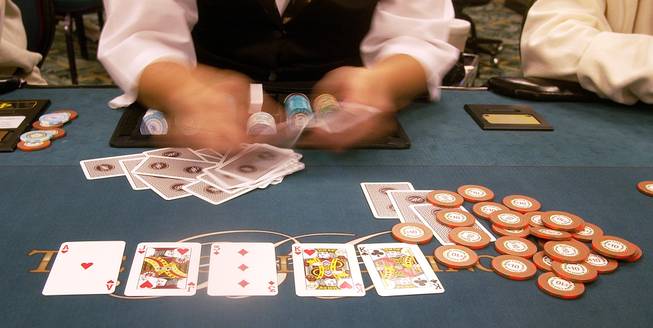
Reed Saxon / AP
The hands of a card dealer are blurred as she deals a table game at the Bicycle Club card room in Bell Gardens, Calif., May 14, 2003.
Tuesday, July 12, 2016 | 2 a.m.
New guidelines issued by state gambling regulators for how card rooms in the state can conduct some high-stakes card games don't satisfy Indian gaming officials, who say the new rules still allow card rooms to illegally have Las Vegas-style games.
The June 30 guidelines issued by the Bureau of Gambling Control, a division of the Attorney General's Office, were aimed at quelling a simmering dispute between tribal casinos, card rooms and state regulators. But it didn't.
Two trade associations representing the card room industry said they were concerned the new rules would cut into their business. And tribal casinos, who under the state constitution have the exclusive right to conduct Las Vegas style gambling, said the new guidelines solve nothing.
The tribes have complained for several years that regulators have allowed card rooms to get around a state law requiring the deal at a card room table be rotated among the players "continuously and systematically." The rule is supposed to prevent a house-banked game, in which one player is the dealer paying off winners and collecting losses — like a casino game.
In 2007, the state's departing chief gambling enforcement regulator quietly issued a letter to the card room industry reinterpreting the law and allowing card rooms to comply simply by offering the deal to another player — whether the deal ends up rotating or not. That has benefited the industry by allowing for higher-stake and more exciting games that attract players.
In February the bureau rescinded that letter, and said it would consider new guidelines. Those now say that the deal should be offered after every two hands.
They also allow for one player to hold the deal for a maximum of one hour. After that time, there has to be a two minute break if no new dealer steps forward. After that interval, play can resume.
Tuari Bigknife, the attorney general for the Viejas tribe in San Diego, said tribes were "disappointed" with the new guidelines. He said that the hourlong standard would allow for as many as 50 hands of some games like blackjack or baccarat to be played before the deal was moved — and that does not comply with the law's requirement that the deal "continuously" rotate.
"We're disappointed with the actions the bureau has taken," he said. "We don't think what has been put out complies with the law."
He said the tribes are evaluating what their options are going forward.
Kyle Kirkland, a card room owner and the president of the industry lobbying group California Gaming Association, said in a statement card rooms were "very concerned about the substantial adverse economic impact these changes will have on our industry's ongoing operation."
The card rooms have said that they have followed the guidance from the 2007 letter put out by the state's chief gambling enforcement agent, Robert Lytle. After issuing the letter, Lytle soon went on to a career as a card room consultant.
Lytle has since surrendered his license after being administratively accused by the bureau in 2014 of a conflict of interest involving his state connections and his consulting business.

Join the Discussion:
Check this out for a full explanation of our conversion to the LiveFyre commenting system and instructions on how to sign up for an account.
Full comments policy